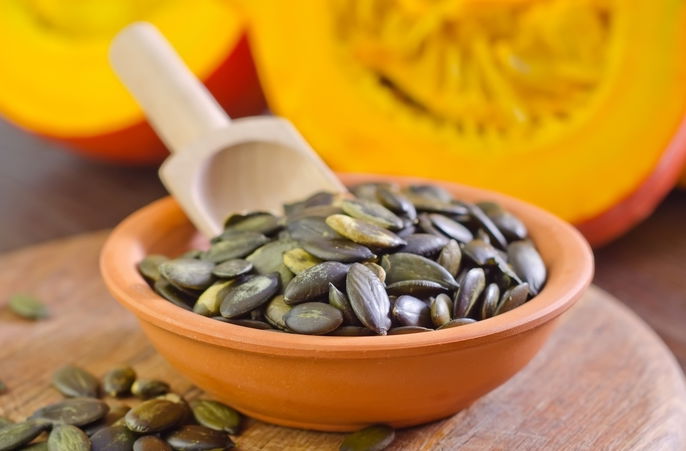Pumpkin seeds can offer many health benefits, like improving brain and heart function, promoting intestinal health and reducing systemic inflammation in the body.
These benefits are due to the fact that pumpkin seeds are rich in healthy fats, fiber, antioxidants, vitamin E, vitamin A, and vitamin C, as well as minerals such as iron, phosphorus and magnesium.
Pumpkin seeds can be roasted and eaten with or without the shell, whole or crushed. They are often added to salads, cakes, breads and yogurts. You can also purchase pumpkin seed oil in health food stores and grocery stores.

Health benefits
The main health benefits of pumpkin seeds are:
1. Relaxation and well-being
Pumpkin seeds possess an great amount of magnesium and tryptophan, which are substances that work within the brain to fight excess stress, fatigue and stimulate the memory.
2. Weight loss
Pumpkin seeds are rich in fiber, which keep you fuller and help to reduce the quantity of food consumed every day. This can help with calorie reduction, which favors weight loss.
3. Increase muscle mass
Pumpkin seeds are a great source of protein, therefore it may be a great food for those looking to increase muscle mass. They can be included in salads, smoothies, yogurt, cereal and snacks. Check out other great supplements for muscle mass that you can take with pumpkin seeds.
4. Protecting cells
These seeds contain a high amount of antioxidants like carotenoids and Vitamin D, which protect cells from free radicals. Pumpkin seeds can help to reduce inflammation and decrease the risk of certain types of cancer, like stomach, prostate, colon and breast cancer.
5. Decrease inflammation
High levels of omega-3 are prevalent in pumpkin seeds, which give these seeds a strong anti-inflammatory action in response to stress or illnesses that cause inflammation. This can help to prevent cardiovascular diseases and other cerebral illnesses, and improve overall mood and memory.
Read more about an anti-inflammatory diet and which foods to eat to combat inflammation.
6. Improve prostate and thyroid health
Pumpkin seeds are rich in zinc, which is a mineral that is important for strengthening the immune system and regulate thyroid function. Some studies show that daily consumption of pumpkin seeds can decrease symptoms of benign prostate hyperplasia and improve quality of life.
Learn about signs and symptoms of thyroid problems to look out for.
7. Treat intestinal parasitic infections
These seeds can be used as a home remedy to treat intestinal parasites. They contain anti-parasitic and anthelmintic properties. It can be consumed by both adults and children. See what can cause intestinal infections and how to treat them.
8. Treat anemia
Pumpkin seeds are an excellent source of plant-based iron, which helps to treat anemia or low hemoglobin. They can be consumed to be vegans or vegetarians to ensure adequate daily iron intake.
It is important to consume pumpkin seeds with a vitamin C source to ensure adequate intestinal absorption. Some examples of vitamin C sources include tangerines, papaya, strawberries and kiwi..
9. Relieve stomach ache
The magnesium content found in pumpkin seeds can help to treat stomach aches and menstrual cramps, as magnesium decreases muscle contractility and nerve impulses. Read about other natural home remedies for stomach aches you can use with pumpkin seeds.
10. Heart health
These seeds possess phytoesterol, magnesium, zinc, good fatty acids and omega. These components contain cardioprotective effects that work together to maintain heart health by controlling blood pressure, reducing cardiovascular risk, decreasing cholesterol levels and controlling blood sugar levels.
11. Regulate blood sugar
Because of their high fiber and magnesium content, pumpkin seeds can help to regulate blood sugar levels. You can also try teas to lower blood sugar naturally with your pumpkin seed intake and medical treatment.
Ways to eat
1. Roasted pumpkin seeds
Dried pumpkin seeds can be used whole in salads or sops. They can also be eaten as an appetizer or snack with a pinch of salt or ground ginger, which is a common Greek delicacy.
Avoid using too much salt, especially if you have a history of hypertension. You can eat around 10 to 15 grams per day for one week to eliminate intestinal parasites.
2. Ground up seeds
You can grind up the seeds in a blender or food processor and add them to cereal, yogurts or smoothies.
3. Pumpkin seed oil
This oil can be purchased at some supermarkets or ordered online. It can be used to season salads or added to soups. If added to a soup, be sure to add it prior to consuming, as heating up this oil can result in a loss of nutrients. Ideally it should be consumed while still cold.
To treat intestinal parasites, you should consume 2 tablespoons of pumpkin seed oil per day for 2 weeks.
How to prepare pumpkin seeds
To consume pumpkin seeds, you should extract them directly from a pumpkin, wash them, then place them on a plate under sun to dry out. Once dry, they can be eaten.
Another way to prepare pumpkin seeds is to place them on a parchment-lined tray and roast them at 75ºC (or 165ºF) until they become golden (which takes about 30 minutes). It is important to shake the seeds at some points to ensure they do not burn. You can also toast the seeds in a pan or in the microwave.
To add flavor, you can add olive oil, or a pinch of cinnamon, ginger, nutmeg or salt.
Nutritional information
The following table outlines the nutrition in pumpkin seeds:
It is important to note that in order to obtain all the health benefits that pumpkin seeds have to offer, it is important to incorporate them in a healthy, active lifestyle.






























